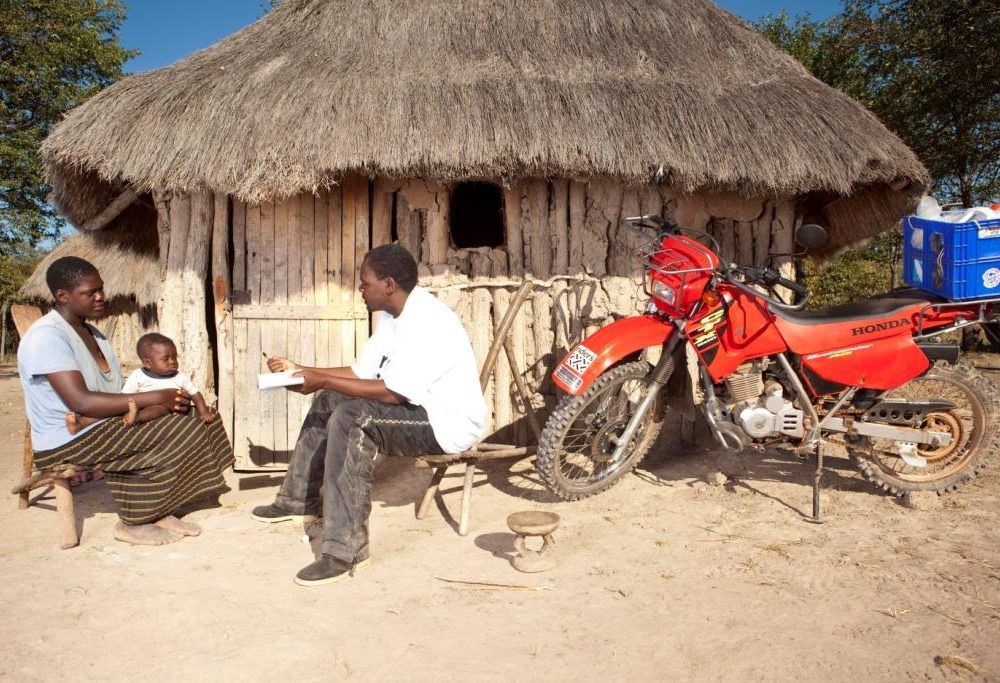
Riders for health: transport for sustainable healthcare delivery
Every year 8.8 million children under five years of age die from causes that are largely preventable and diseases that are easily curable. Across Africa, health workers have the expertise to turn this situation around. But without reliable transportation the delivery of essential healthcare services is virtually impossible. Riders for Health strengthens healthcare systems in rural Africa through reliable transportation and the development of a sustainable transport management system. The result is that 12 million men, women and children now have improved access to regular healthcare.
Impact
Riders currently manages a variety of vehicles (motorcycles, ambulances and trekking vehicles) across seven African countries and mobilises over 1,000 health workers. The result is that 12 million men, women and children now have improved access to regular healthcare.
Beneficiaries
Riders offers vehicle management services that benefit stakeholders throughout the healthcare delivery chain. Key beneficiaries include:
Partners: Riders’ services support our partner organisations in the attainment of their health-focused goals. We offer training in vehicle maintenance, fleet management and journey planning, giving NGOs and governments the expertise they need to maximise service efficiency, and keep healthcare moving. Finally, our robust financial system enables accurate budget planning and maximises valuable resources.
Outreach Health Workers: With reliable transport, an outreach health worker can provide five times the number of people with regular healthcare services and follow-up visits than before.
Locals Communities: Outreach health workers provide a public health service and are key to reaching those most in need. They provide communities isolated by barriers of distance, terrain and poverty with the basic healthcare services. These include: immunisations, health education, nutrition advice, and disease prevention. Riders services offer support to pregnant mothers, orphans and vulnerable children, TB patients and people living with HIV/AIDS
Sustainability
To ensure sustainability, Riders works in close collaboration with health-focused partners; managing their transport so that basic health services reach the people who need them. As a result, we have focused our expertise in the development of a transport management system that is both sympathetic to its environment and appropriate to local context. Each of Riders’ programmes are run and managed by local people. This allows appropriate skills to be transferred and best practice policies introduced. Individual vehicle users are taught essential skills in defensive driving, together with daily maintenance routines that will ensure the overall function of their bikes. Riders operate two specialist training academies, located in Kenya and Zimbabwe.
The sustainability of our programmes is further ensured by the innovative financial model we employ, and the strength, transparency and committed nature of our partner relationships. In the Gambia, for example, Riders operate a nationwide model that is now financed by the Ministry. A self-sustaining project, this will make it the first country in Africa with enough vehicles to provide reliable healthcare services to its entire population.
Innovation
Riders’ innovation is the development of a transport management programme that keeps healthcare on the road, no matter how harsh the terrain or hostile the conditions. Our system is rooted in the understanding that vehicles themselves are not the answer. It is the maintenance systems in place that are pivotal to reliable and consistent service delivery. A cost-effective and practical solution, Riders systems have proven more appropriate for development (particularly for government ministries) than any other private-sector service.
The agencies with which Riders works have a core competency in health, they do not (and in our opinion, should not) have expertise in fleet management. At Riders, we believe that these specialist areas should be outsourced to a partnership agency – and, at present, we are the only organisation taking such a collaborative and ‘hands-on’ approach to healthcare development. Driven by the same commitment to a positive health outcome as our partners, such shared objectives have inspired us to create a sustainable infrastructure that compliments existing systems, maximises resources and builds in-country capacity.
Scalability
In the development of our core service models Riders worked in close consultation with all stakeholders, creating a solution that was appropriate to the identified health care needs, but ultimately replicable across sub-Saharan Africa.
As a result, our programmes are scaled across seven different countries and range from nationwide service agreements through to a low-level grassroots approach. Each programme is tailored to the needs of individual partners, but remains rooted in Riders core maintenance system.
At present, Riders operates nationwide programmes in the Gambia, Zimbabwe and Lesotho, and regional programmes in Nigeria and Zambia, where we manage the vehicles of the ministries of health and other agencies including the United Nations and WHO. In Kenya and Tanzania, Riders operate smaller grassroots programmes that aim to increase the reach of local care-giving groups.
Source of funding
One of the factors that defines Riders as a social enterprise is the diverse range and composition of income and funding. Riders’ funding comes from five main streams:
Grants And Awards: The funding received from grants enables Riders to build capacity in existing programmes and to invest in new activities.
Earned Income: Riders operates on a full cost recovery basis by charging partners a non-profit fee for our services. The foundation of this system is the unique Cost Per Kilometre (CPK) calculator, an algorithm designed to give the true running cost of any vehicle in any given environment.
Donations: Riders raises funds from individuals, groups and corporations.
Motorcycling Events And Activities Riders raises a significant proportion of our unrestricted income from the international motorcycling community, with activities including our annual centre-piece event, The Day of Champions.
Capital Finance (loans /debt) – During 2010, Riders obtained significant capital financing through an innovative financing mechanism with the Venture Partnership Foundation (VPF).